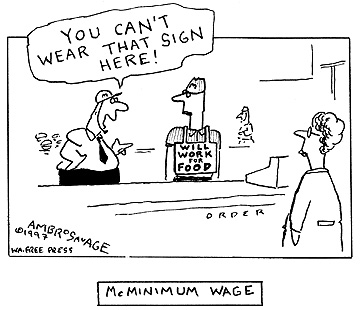This movement has its first success in Baltimore, where a living wage ordinance was passed two years ago requiring contractors to pay their workers $6.10 per hour. That amount was raised to $6.60 last year, and will rise to $7.70 per hour in 1999, or about equal to the federal poverty line for a family of four. In Milwaukee, the City Council and then the School Board passed ordinances requiring that employees of city contractors receive at least $6.50 per hour.

|
|
John Ambrosavage © 1997
|
Living wage ordinances that affect companies receiving government contracts have also passed in Jersey City, and Portland, Ore. A successful measure in St.. Paul has spawned a similar measure in neighboring Minneapolis. Such measures are under consideration in New Haven, Chicago, New York, and San Jose.
In Los Angeles, the livable wage effort has been aided by the Mayoral campaign of State Sen. Tom Hayden, who has been supporting the living wage ordinance as a central plank of his campaign against Mayor Riordan. The LA proposal would require most companies receiving city contracts or financial assistance to pay their workers $7.50 per hour with benefits, or $9.50 per hour if no benefits are offered.
A statewide measure in Minnesota to require companies receiving at least $25,000 in economic development funds to pay workers $7.28 per hour passed the legislature last year, but was vetoed by the Governor. But a less comprehensive measure requiring companies receiving aid from the Minnesota Investment Fund to pay $8.01 an hour did make it past the legislature after it was attached to a bill containing funds for programs the Governor supported.
In Washington state, activities are currently focused on pushing for an increase to the state minimum wage. A measure to raise the minimum is being developed by Representatives Tip Tokuda and Frank Chopp, among others. Governor Gary Locke has in principle supported a rise as part of his campaign to "make work pay" for welfare recipients and other struggling working families.
Since the minimum wage is likely to go nowhere in a Republican-dominated legislature, supporters are gearing up for a possible initiative campaign. Advocates of an increase have formed a "Coalition for a Livable Wage," which while pushing for an increase is also adopted more far-reaching principles regarding access to health care, pensions, training and re-training, housing, affirmative action, and the right to join a union. Some supporters of the minimum wage increase hope that this campaign will provide the organization and publicity from which to spearhead broader livable wage efforts. According to Chuck Lare of Washington Jobs with Justice, the minimum wage campaign will result "in the resources and database to build something of more significance."
Some living wage campaigns have failed. In Houston, 50,000 signatures were collected to place an ordinance on the ballot, but despite strong initial support the measure was defeated after a well-funded opposition campaign led by the restaurant industry. Measures failed in Missouri and Denver, and in Montana a ballot measure was defeated last fall after the opposition received a $200,000 campaign contribution from the National Restaurant Association, which led to a barrage of negative ads.
But succeed or fail, livable wage movements are not only attempting to achieve an admirable goal, but also help to forge broad community-based alliances including churches, unions, and social justice advocates.
[Home]
[This Issue's Directory]
[WFP Index]
[WFP Back Issues]
[E-Mail WFP]
Contents on this page were published in the March/April, 1997 edition of the Washington Free
Press.
WFP, 1463 E. Republican #178, Seattle, WA -USA, 98112. -- WAfreepress@gmail.com
Copyright © 1997 WFP Collective, Inc.





